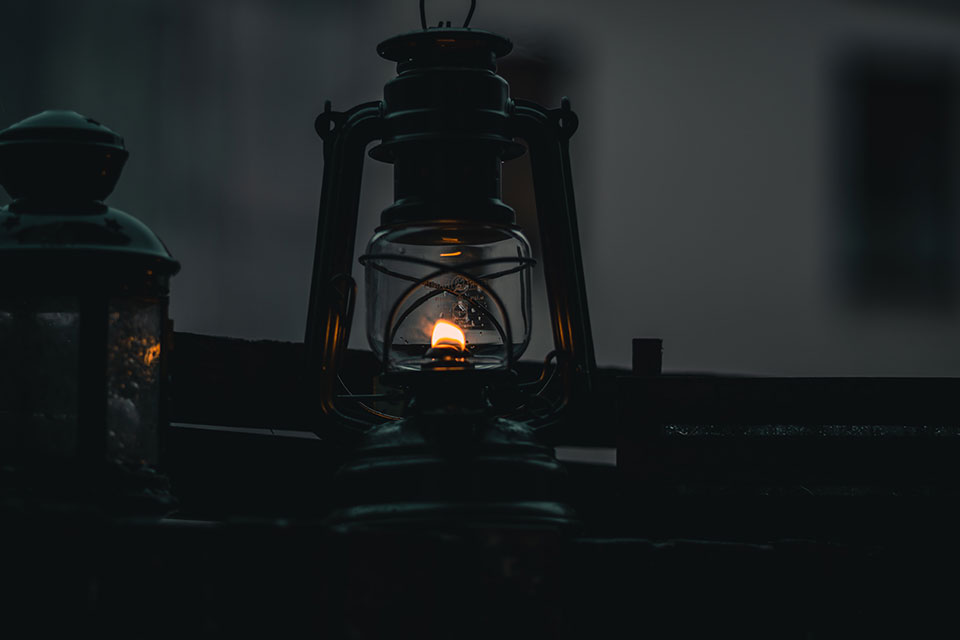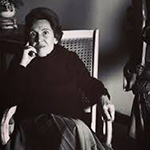A Story in Five Stages

The Woman
He was a disgrace of a man. The lowest of the low. He pounded the table, every blow making the kerosene lamp shudder. The noise was accompanied by intermittent bursts of neurotic ranting and floods of tears as each new wave of catharsis hit. A shack by the railway lines was as poor as you could get, but it didn’t matter. In our world overflowing with things, not to own any more than a bed, a table, the stool for the tub, and the box in which they kept the primus stove—at a stretch you could add the semaphore flags from a scrapped tugboat they used to patch up holes in the wall—wasn’t so bad either. Because, until a few hours ago, she, the woman, had been there, singing and laughing, whether out of stupidity or happiness, or both, was a mystery. But she also cried from time to time to keep herself amused, as she rather mysteriously explained.
The entire shack shook when the train rumbled by, and whatever was hanging on the hooks occasionally fell to the floor. She had a system: she’d laugh at the racket made by the utensils’ sudden fits while trying to mitigate their effects. She could feel the vibrations from some way off through the soles of her feet. Then, when the moment came, she’d hug the most precariously positioned objects to stop them from falling, grabbing each for a moment in turn, like a juggler.
She had a system: she’d laugh at the racket made by the utensils’ sudden fits while trying to mitigate their effects.
“Elena, Elena,” the man called quietly, as though she had suddenly materialized from out of the void she’d left behind.
He drew her in the air. She had a pointy nose and clean teeth thanks to her miraculous saliva. And her skin always gleamed even though they didn’t have a bathroom, thanks to the tub on the stool, which they had to keep an eye on because the floor was uneven. It was these relatively neutral considerations, unrelated to her dramatic flight, that allowed him to enter gingerly into a state often left unguarded by grief, the kind that tends to appear when one is mourning a loved one, drying up their tears.
In this abrupt shift from pain to oblivion, he conjured her when the night train bore down upon them, when they were both in bed and she, by force of habit, woke up to find that she was hugging him tight to make sure he didn’t fall. Then, racked by the force of the locomotive, he felt all the vibrations that can course through a female body assembled from minor additions to the main carving, like the dolls children make before they’ve reached creative maturity.
He blew his nose and reread the scrap of paper:
I’m leeving, I fele anover destinee callin.
If itz good, yool never see me agane.
Then he heard the approach of the damned train, which was accompanied by the barking of the dog that had decided to stay, and prepared himself for another inanimate performance of Saint Vitus’ Dance. Damn. All she’d taken with her were the semaphore flags, which she’d treasured from the first. So she wasn’t coming back, not ever. It had been decided. The feeling that there was nothing to be done came to him like a comforting pat on the back, offering reassurance about the inevitability of events. Yes, he said to himself before anyone could say it to him, if there was a glimmer of hope it would have been much worse; it would only have pointlessly prolonged the grief. A green flash swooped from one corner of the room to the other before disappearing in the lonely air, just as the kerosene started to run out and the wick in the lamp began to sputter like it was hopping along on one leg.
It was almost morning. He knew thanks to the rooster, who was such a good husband and so discreet in his grief as his hens got eaten one by one. Then they were gone, along with the last kernel of corn. And so, he was left to peck in the dirt in search of worms, something he’d become practiced at. But maybe they were running out too. Was that everything? No. There were still the dog and the horse, who always got something to eat even when the man went hungry. Taking stock, womanless Juan realized that in fact he had many worldly belongings. Even now that the flags were gone. And what was better for plugging gaps than newspaper? He’d never heard of anyone treasuring old newspaper . . .
The Rooster
He came and went in his bachelor home with the philosophy of space one develops in bed when there’s no one else there to bother you anymore and you can stretch out your limbs to your heart’s extent. Because at the end of the day, who cared? The filth that began to encrust the pans in the woman’s absence didn’t matter, it was just grease. And grease cures the metal, improving the taste. His late mother always said, The rich don’t know what true flavor is; they’re always wiping the asses of their pots and pans . . .
That morning, even though thirty days had passed since the abandonment, he woke happier than ever. The dog and the horse had kindled the glow that can only come from inside, because one can feel it in the middle of the night. He looked at the patch of ground where the rooster generally squawked and scratched around but couldn’t see it. Hell, that’s right, he hadn’t crowed that morning. And he hadn’t got into a fight either. Roosters are like sovereign nations when threatened. Preparing to investigate, he girded himself with all the patience he could muster so as to savor the pleasure of the deed, then he got on the horse and set out to search the field that ran alongside the railway, followed by the dog. Lo and behold, about half a league away, he saw it, walking who knows where, like a prehistoric man in search of fertile land, having apparently forgotten all about the time when there was corn, which then was downgraded to crumbs from the table but was still something. And then, when no one was leaving any crumbs, it became long days hunting worms, whose numbers dwindled into nothing.
The man got closer and closer to the animal, which was following the railway like a sleepwalker along a parapet. He was just a couple of steps away when suddenly he thought twice. Not just about his role as the owner of an errant rooster, but about himself and his own freedom to roam. A rooster leaves because there are no more holes in which to find worms, he thought. But it was similar enough to a man who sets out wandering with no fixed destination, when need begins to bite and the days come and go, getting more oppressive all the time . . .

The Dog
There wasn’t anything left to fear. In the end, the property one loses is always the best, because at least it has revealed its innate disloyalty; it just comes straight out with it. He reasoned this way all along the fence back to the shack, when, no longer alerted by the woman’s sensitive feet but the dog’s keen ears, he knew the train was coming. As usual, the canine braced its hind legs in the gravel, ready to shoot forward when the formation arrived, barking as loud as it could as it ran alongside for a few feet. Events had precipitated themselves, as they always did. Suddenly, the way we witness fleeting moments in dreams, he saw the image of the train’s cook throwing food out of the window flash before his eyes. The dog, suffering from the discreet hunger that was the order of the day in the shack, swallowed its pride and snaffled whatever it could. But the cook, whose provisions had apparently all gone off at once, threw more and more over the side. And so, the dog dropped what he had in his mouth and went after the next morsel, not actually eating anything while simultaneously trying to protect what it had. As the man watched, the train continued to disgorge its rotten belly and the damn dog went after it, picking up and dropping its catch. Then there was nothing more to see.
He waited all afternoon. A dog is the last creature you’d expect to abandon you for a glimpse of plenty. Yet that was what happened, as good as sealed in writing. When it comes to betrayal, you never know, he said in the now-still afternoon air, even a dog might leave a home that the woman and rooster could no longer bear.
Even a dog might leave a home that the woman and rooster could no longer bear.
That evening, the signs that a storm was approaching were increasingly obvious. And he clung to this meteorological happenstance because it offered him the same distraction as on his first night without the woman, allowing him to concentrate on the unimportant things swirling around the air. When the first drops started to fall, he could tell from the color of the sky that this would be an affair of wind and water, so he tied the horse to the strongest fence post he could find and headed into his shack, ready to savor to the full the knowledge that he was a solitary man, who no longer had to defer to anyone and was now free to follow the urge to abandon everything for someone else to claim.
“I’m a damned slave to things,” he said, lighting the lamp. “Blasted junk. You spend half your life accumulating things. And then one day you want to ride out, even if it’s just bareback, and you can’t let go. Sometimes just because you can’t stand the thought of a family of lizards moving into the mattress where you once slept.”
The Horse
That night, the sky unloaded. The whistle of the locomotives and the wind tearing the balls of newspaper out of the holes in the wall formed a savage duo that could only be borne by pouring something strong into your stomach and shoving your head under the blankets. He was about to blow out the lamp when a powerful bolt of lightning struck a nearby quarry, accompanied by a crack of thunder that almost blew the whole shack away. It’s a good thing I tied the horse to that fence post, he thought, because if I open the door now the wind would sweep everything up, like in a hot-air balloon. The sulfurous smell in the air slowly lulled him to sleep.
The next morning, everything was silent. It was the misleading calm of a battlefield when the soldiers now lie prone on the ground. The only survivor opened his door a little apprehensively and looked around. The surrounding mud, a dark quagmire, wasn’t going to dry for days. He also noticed something amiss. It was like waking up in a friend’s room after they’ve taken you home following a night’s heavy drinking. Then he suddenly realized what it was; the fence had gone. Hardly news after such a dramatic night . . . But neither could he see the horse. It had ripped the post out in the night with its brute strength, spooked by the lightning bolt and unable to shake itself free of the harness.

The Wire
Without the horse or even a fence for support, he decided to escape the treacherous mass of mud as best he could. Here and there, protruding stones gave him something to jump onto, and purchase for the next leap. He came to what was left of the fence that ran along the railway. Only the top wire remained; the others had been torn away in the night. It was barbed, so he worked his way along very carefully. But it was hard to avoid getting scratched; the barbs were placed closer together than a hand’s width. Whatever he tried to reduce the risk backfired; either he sank into the mud, or he clung on harder and the fence reminded him of the price of passage. During one such moment, he fell flat on his back. It was a humiliating feeling, like a cockroach with its legs in the air, and it stripped away the last vestiges of his human pride. Struggling back upright, he grabbed hold of the wire with both hands, ignoring the vicious rosettes with which it was adorned. As he suffered, fleeting memories began to come back and strange images appeared before him in the air (the rooster spinning on a weathervane, the woman and the horse in a circus arena) half-real and half-nightmare. But most of all it was crucial to maintain the balance between the mud and the wire, mud that stretched on for quite a while when he might come across a gap in the wire at any time.
It was when he was hesitating between carrying on and just allowing himself to fall into the mud, and his instincts were telling him that a train would soon be roaring past, that a memory which had been buried somewhere in his existence—of night after night assailed by endless prayers to ward off a condition that apparently threatened his life—came to him. A woman whose face had been buried under layers of temporal strata was pleading to someone in the same special way he adopted in his hope that the wire wouldn’t come to an end. It was strange, but he couldn’t remember how it ended; it was like a novel with the last page torn out but that all the better reflected real life, in which climaxes are superfluous. An ending like this, for example, now that the wire had run out. It was interrupted by a post to allow the passage of a firm road. Grabbing hold of this final source of support, the man saw the carefree world of vehicles and pedestrians a little further on. He was about to start barking recriminations for what they had just done to him, interrupting his vision, when the mysterious personage who had been the subject of the medicine woman’s entreaties, who might well have been embedded in the wire, seemed to change their message. He could barely believe his eyes, but it was happening right in front of him. There was his wife, back from her fruitless adventure, walking down the road, with the skinny rooster under her arm and the bearing of a mother who has found a lost child playing by the river and is getting ready to scold them at home. Behind her and a little to the side, its ears drooping and a world of incommunicable experiences in its gaze, trotted the dog. Now, thought the man, still clinging to the post, the three of them needed to go out to look for the horse, so the cycle could start over.
Translation from the Spanish












